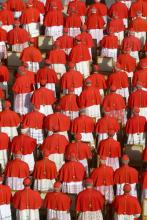priorities

SOMETHING WONDERFUL is happening in popular cinema: a new psychological depth married to kinetic technique that seems to emerge from filmmakers’ willingness to show their vulnerability. Notice how First Man is far more than a moon landing epic; it’s massively about the heart. Blindspotting takes racism more seriously than it takes itself. And Leave No Trace doesn’t settle for catharsis but invites us to do something in response to the brokenness on screen. There are dozens more films like this.
The psychological depth and open vulnerability of these films are mirrored in the way we talk about movies. It’s easy to find good film criticism that tells us about the writer’s life, and conversation about how cinema interacts with the world is no longer exclusively an elitist game.
But our favorite films don’t just tell us what we think about the world: They tell us something about what we think of ourselves. If what we pay attention to shows us what we love, it may also show us what we allow to love us. It bears exploration: What do our favorite films say about who we are, who we want to be, how we see the world, and what we feel we deserve? What are they inviting us to become?

IN MINDANAO, Philippines, a cheer went up: Mayron tayong cardinal! (“We have a cardinal!”) In January, Orlando B. Quevedo, archbishop of Cotabato, was one of 19 new cardinals named by Pope Francis.
Cardinal Quevedo rose from newsboy to archbishop. He’s renowned for his interreligious work and cofounding a Catholic-Muslim peace community in the southern Philippines where there is violent ethnic conflict. Quevedo is a leader in the Federation of Asian Bishops’ Conferences, a body representing more than 100 million Catholics that has courageously pushed forward the values of Vatican II amid traditionalist backlash.
During a papal conclave, when a new pope is chosen, much of the world, Catholic and otherwise, pays close attention to the news ticker from the Vatican. For the selection of new cardinals, not so much. But with Francis, everything bears watching.
Historically, cardinals were called “the princes of the church” because of the power they wielded. Functionally, they serve in the College of Cardinals, which meets with the pope to deal with questions of major importance and elects new popes. Sadly, scoring a red hat has been for some the acme of clerical ambition. The season of cardinal picking can devolve into extravagant indulgence.
But, there’s a new sheriff in town: Pope Francis wants deputies, not darlings.

NEW YORK — The "October trifecta" that touched my life — my father's death, surgery the next day, and the unprecedented destruction of Hurricane Sandy around New York — did what traumatic events often do.
They left me emotionally fatigued and ready for some fresh clarity, fresh perspective, and fresh prioritizing.
When life seems fragile, it's clear some things matter more than others. It reminds us that attention must be paid to family, friends, and the differences we make in our work and our faith. Lesser concerns — like the tablet computer I have been angling to acquire — quickly fall away.

“There can be no high civility without a deep morality" ~ R.W. Emerson
“Why can’t we all just get along?” ~ Rodney King
Some of the most heated conversations I have ever participated have been with other people of faith whom I sincerely believe want the same things I want, worship the same God that I worship, and labor as hard as I do to promote human flourishing.
During this election time, we have come to expect the rhetoric to replace reason and civility is a term that has no place in our discourses. Our disagreements are often not cognitive disagreements, but differences in morality and decency. This is why they take a personal tone that is easily offended and strongly defended.
It is interesting that modern psychologists have demonstrated that our understanding of morality is actually not as easy as “right or wrong,” but rather based on five different axes or foundations. According to Psychologists Jonathan Haidt and Jesse Graham, each foundation contributes to our formation of how “right” or “wrong” an action is.

Imagine a Catholic Church that stopped catering to its tiny cadre of old male bishops and heard instead the cries of its people. Or a fundamentalist movement that stopped defending its franchise by nonsensical attacks on evolution and modernity, and instead took Scripture seriously.
Imagine a conservative Christian movement that dropped its relentless assault on women's rights and instead sought a fresh vision of family and values. Or a progressive movement that listened to people, rather than lecturing them.
Too many "providers" — in politics, business and religion — come across as having a low opinion of their constituents. People tend to be good judges of what matters to them. Voters know this recession better than their would-be leaders seem to know it. Believers seem to take their faith more seriously than those institutions that seek to enroll them as members.
The debate we have just witnessed has shown Washington, D.C. not just to be broken, but corrupt. The American people are disgusted watching politicians play political chicken with the nation's economy and future. In such a bitter and unprincipled atmosphere, whoever has the political clout to enforce their self-interest and retain their privileges wins the battles. But there are two casualties in such political warfare: the common good and the most vulnerable.
So how will vulnerable people fair under this deal? "The Circle of Protection," a diverse nonpartisan movement of Christian leaders, has been deeply engaged in the budget debate to uphold the principle that low-income people should be protected. But it is hard to evaluate a deal that averts a crisis when the crisis wasn't necessary in the first place. Over the past few weeks, our economy has indeed been held hostage as politicians negotiated the price of the release. Ultimately, I think most of us wish that no hostages had been taken in the first place, and this was no way to run a government or make important budget decisions.
Yesterday, the leaders of more than 50 Christian denominations and organizations drew a line in the sand of the budget debate, and asked our political leaders to do the same.
On Easter weekend, I will break my fast. I will have spent almost four weeks drinking only liquids. But, as is often true of fasts, what has been gained is far greater than anything given up.
Across the United States, there is a new movement emerging to dramatize the immorality of corporate tax dodging in the face of drastic budget cuts.
In Tucson, Arizona, President Obama spoke to the state of the nation's soul. Next Tuesday, January 25, he will speak to the state of the union.